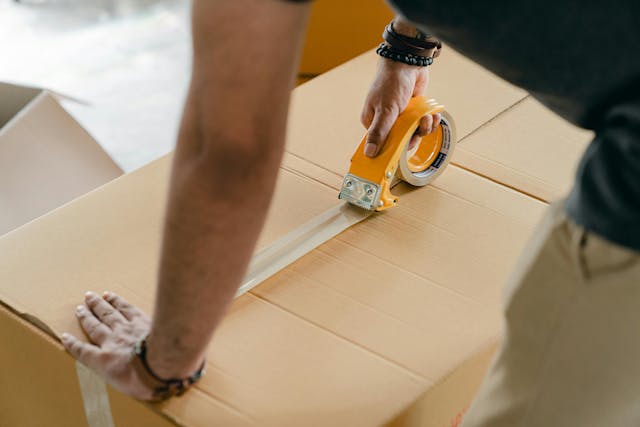AGEC Law: Key Issues and Obligations for Retailers
7 July 2023

Today, we’re going to talk about a topic that concerns all retailers committed to responsible practices: the AGEC law, or Anti-Waste for a Circular Economy Law. Discover the ins and outs of this law, as well as your obligations as retailers who care about the environment.
What is the AGEC law?
The AGEC law is a bit like your trusted partner in your quest to run an eco-responsible business! Adopted in France in February 2020, its aim is to fight waste, promote a circular economy, and preserve our precious natural resources.
The AGEC law is based on 5 main objectives:
- eliminate single-use plastics
- better inform consumers
- act against waste and for solidarity-based reuse
- act against planned obsolescence
- and produce better.
In other words, it encourages you to rethink the way you produce and consume, with a focus on sustainability and respect for the environment. But it’s only since 1 January 2022 that the AGEC law has applied to all retailers. As such, you are now subject to the new reforms that we will detail in this article.
The key issues of the AGEC law:
The AGEC law is a real breath of fresh air for our planet! Thanks to concrete measures, it paves the way for a more sustainable future by addressing several key issues:
- Goodbye to waste: Thanks to the AGEC law, we say goodbye to waste at every level. It encourages reuse, recycling, and the recovery of end-of-life products. Nothing is lost, everything is transformed!
- A circular economy that works: This concept involves designing products so that they can be reused, repaired, or recycled. The AGEC law encourages you to adopt eco-design practices. For more durable and planet-friendly products!
- Information is power: Your customers deserve to be transparently informed about the environmental impact of the products they buy. The AGEC law pushes you towards transparency by providing clear and understandable information about the ecological characteristics of your products. This will also strengthen your relationship with your customers!
Your obligations as retailers:
Now, let’s look at your obligations as retailers committed to the AGEC approach. Don’t worry, nothing too complicated! Here’s what you need to know:
Displaying environmental information:
You are responsible for making environmental information accessible and visible to your customers. In practice, this means you must clearly display information about the environmental impact of your products. These are simple benchmarks for consumers. They allow products to be compared and help customers make informed choices at the time of purchase. This could be a rating such as A-B-C-D-E, a score out of 100, or an “environmental cost index” calculated over the entire life cycle of the product concerned.
Extended Producer Responsibility (EPR):
The AGEC law strengthens producer responsibility, and this includes certain retailers. If you import, manufacture, or distribute products subject to extended producer responsibility, you must ensure that these products are collected and properly treated at the end of their life. In short, whoever manufactures, distributes, or imports a product must take responsibility for its end of life. You can contact the relevant organisations to find out about selective collection or take-back schemes. Two of the main obligations arising from the principle of extended producer responsibility: the eco-contribution (detailed below) and the take-back of certain used products.
As a retailer and e-retailer, you are required to take back used products of the same category or type as those you sell, when returned by your customers. This obligation applies to products subject to EPR. Take-back can take different forms, such as setting up collection points in your shop or working with specialist recycling and recovery providers. For distance selling, the product must be collected from the place of delivery. Managing returns is now a real challenge for many retailers. Cocolis can support you in this process with its economical and ecological delivery solution—think about it!
Eco-contribution:
Also known as eco-participation, this is a contribution paid by the buyer of new equipment to help fund the extension of its lifespan and its disposal. The eco-contribution is paid to state-approved organisations that support this process. Products subject to the eco-contribution are electrical or electronic products, known as WEEE: Waste Electrical and Electronic Equipment. If you sell products subject to an eco-contribution, don’t panic! You simply need to collect this contribution from your customers and pay it to the relevant organisations. The mention of eco-participation must appear on labels, clearly and separately from the product price. It’s a concrete way to help protect the environment.
Goodbye planned obsolescence:
Another important aspect of the AGEC law is the fight against planned obsolescence. As a retailer, you must avoid selling products whose lifespan is intentionally limited. Instead, encourage durable, repairable, and high-quality products. Your customers—and the planet—will thank you!
You’re now experts on the AGEC law!
You now know what it means, its impact on our environment, and the obligations you have as responsible retailers. By meeting these obligations, you are actively helping to protect our planet and meet your customers’ expectations for eco-responsibility.
You’re now on the right track to becoming a model business in the transition to a more sustainable economy. Don’t stop there! Close the loop by offering your customers an innovative delivery solution: co-transporting!
By pooling the planned journeys of vehicles already on the road, Cocolis is inventing a delivery service that’s more respectful of the planet. Need a solution to manage your delivery returns?


